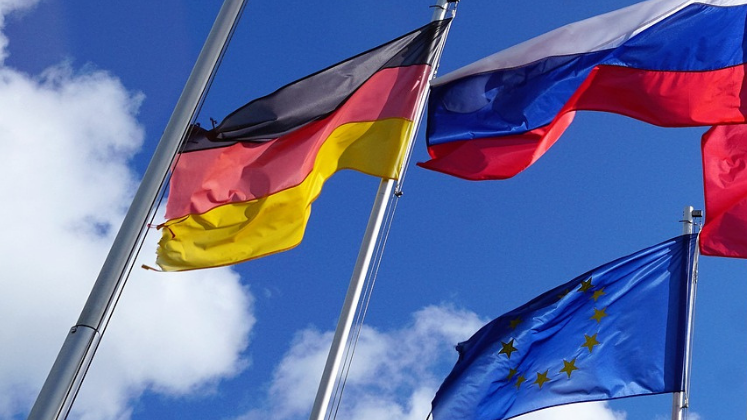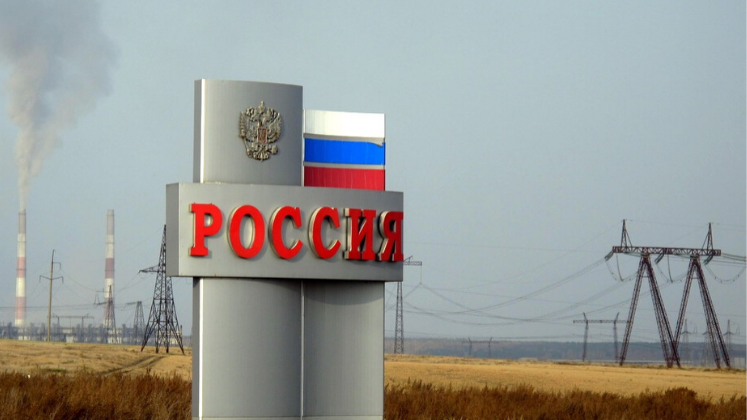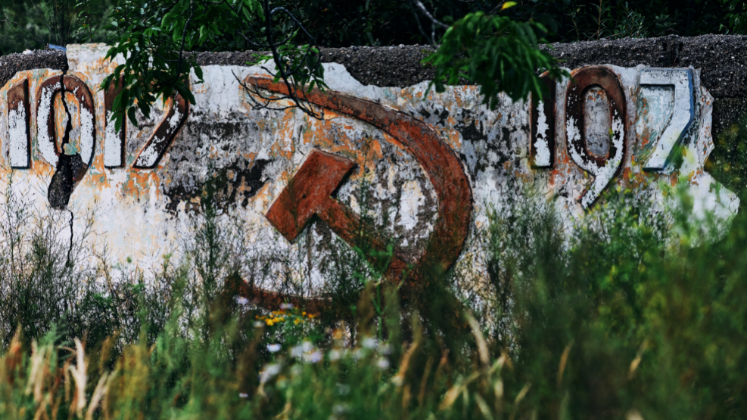In Russian Grand Strategy in the Era of Global Power Competition, editor Andrew Monaghan brings together contributors to explore the military, political and economic features of Russian foreign policy. This book will be a useful starting point for researchers, policymakers, students of history and politics and all those looking to understand Russia’s long-term goals and sense of its place in the evolving world order, writes Matthew Kolasa.
Russian Grand Strategy in the Era of Global Power Competition. Andrew Monaghan (ed.). Manchester University Press. 2022.
Global or All Over the Map?
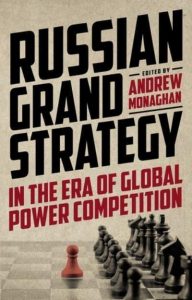 Find this book (affiliate link):
Find this book (affiliate link):![]()
Russia’s aggressive foreign policy has left many asking if Russia is global or merely all over the map, yet Russian leadership is no mere opportunistic improvisor. Rather, it has a grand strategy and long-term goals. So argue the contributors to Russian Grand Strategy in the Era of Global Power Competition.
This timely new volume from Manchester University Press, edited by Andrew Monaghan, assembles academic and policy experts from six countries. The book is self-consciously focused on identifying a Russian perspective (with empathy rather than sympathy) for a Euro-Atlantic policymaking audience. Russian Grand Strategy enters a crowded field, joining recent studies by RAND and others. Monaghan’s volume distinguishes itself by focusing on strategy, providing multidisciplinary analysis from the perspective of figures at the top of Russia’s security, intelligence and administrative circles.
Many pundits have of late focused too much on Russian President Vladimir Putin’s isolation and mental health while ignoring systemic influences and the long-term strategy Russia has attempted to implement. Contributor Florence Gaub argues, ‘The first step for Europe is to recognize the very fact that Russia is trying to play a long game,’ and Ian Hill adds that Russian foreign policy is ‘characterised by a remarkable consistency of strategic outlook, intent, and purpose’.
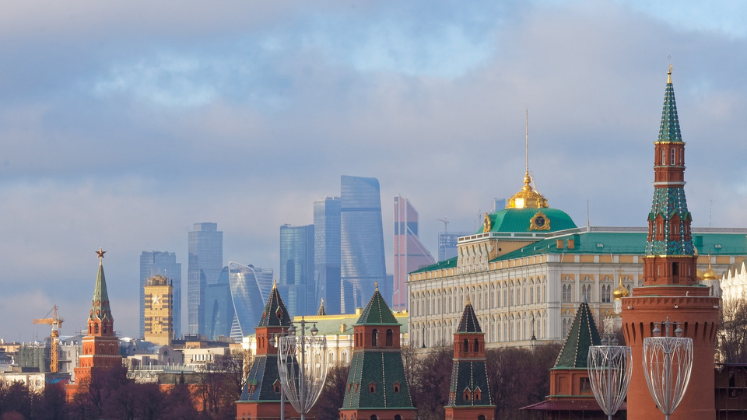
Image Credit: Image by Anatoly Kalmykov from Pixabay
Contributions include chapters on Soviet-Russian cartography, naval strategy, military technology, energy exports, polar sea route claims and the institutionalisation of strategic vision. Alexander Kent describes the legacy of Soviet cartography that has allowed Russia to understand in detail how terrain would affect the battlefield, to notable success in Syria after 2015. The detailed mapping capability among specialists, accessible to the Russian leadership, has failed to translate into success during the 2022 Ukraine invasion as Russian conscripts lack the training and equipment needed to take advantage of this cartographic knowledge. However, the revived military cartography apparatus nonetheless supports the argument of a Russia with global interests.
Michael Petersen demonstrates Russia has global maritime interests and prioritises not only access to warm water ports, but also its role as a global naval power with a base in Syria and a naval port under construction in Sudan. It also has the ability to project power in the Indian, western Pacific, Arctic and even Atlantic Oceans. The rebuilding of a navy after 1991 has met with mixed success, but the long-term planning and global ambition of the navy are evidence Russia has integrated its naval and grand strategies, despite the traditional conceptualisation of Russia as a land empire.
Nazrin Mehdiyeva expands on this maritime discussion and combines it with energy, the Northern Sea Route and Russian Arctic claims, with Russia’s selective attention to the UN Convention on the Law of the Sea. She also discusses Russia’s development of the world’s only fleet of nuclear-powered ice-breakers and its investment in a military presence on the desolate Arctic coast.
Charles Bartles writes of Russian ambitions to build a ‘sixth-generation’ military, learning from US successes in Kuwait and the former Yugoslavia. The chapter focuses on a small number of Russian military thinkers and could better demonstrate whether the approach is part of a coordinated policy across branches. Development of precision-guided munitions and hypersonic missiles does not necessarily mean Russia has fundamentally changed its military power: a prototype is not equivalent to fully operational deployment. Readers of this chapter may risk taking Russian claims of its capability at face value. While Bartles seeks to develop a Russian vision, greater clarity on whose vision it is would be beneficial and the difference between current capability and future aspirations warrants fuller explanation.
Richard Connolly offers a prescient chapter on the export of strategically important goods, especially energy and food. These goods magnify the country’s potential influence on the world economy in ways that belie a cursory glance at Russia’s level of trade as a share of global GDP. Including this chapter in a volume on grand strategy shows the role linkage can play in magnifying a country’s ability to achieve its foreign policy objectives. In another chapter, Julian Cooper delves into government attempts to write a unified strategic policy into federal law. This chapter does the important work of elucidating how Russian power differs in practice from its theoretical constitutional basis.
Some chapters have aged better than others in the months since the book’s 2022 publication. While Russia’s expansion of its Ukraine invasion laid bare military and logistical weaknesses, some of Russia’s difficulties were already visible. One issue clearer in some chapters than others is the difference between a plan and its implementation. On paper, Russia is the dominant force and able to project power with clarity and precision from Moscow using the latest technologies. In practice, much of Russia’s road to global ubiquity is yet to be paved.
Two aspects of grand strategy could have comprised additional chapters: first is the historical context of Russian grand strategy and its remarkable consistency over recent centuries. Second, a deeper discussion of Russian strategic vision and worldview, as famously described by Henry Kissinger. A sense of vision rooted in the government’s perception of its own history and destiny merits more discussion. Moscow has sought a European and Eurasian role since the 1700s and global influence since the 1800s. Russian attitudes toward ethnic Russians abroad also deserve further attention. This 196-page book leaves room for additional chapters to give a deeper sense of history, visions of world order and Russia’s mixed results in achieving its goals.
Informal aspects of power have a profound effect on how Russia works. From Putin’s dominance to the informal arrangement between the Kremlin and oligarchs to the complicated role of power fungibility in a federation, various phenomena create a gulf between vision at the top and implementation in the various organs of government power. Discussion of these topics would allow the book to clarify the difference between theory and practice in Russian foreign policy. There are risks to heavy reliance on Russian sources in its halls of power. First, a government document may prove more aspirational than operational. Second, policy planning documents may belie political realities precluding reform, though Chapter Six raises these risks. Third, concentration of power in a small number of people around a despot makes it harder to predict the leader’s focus, even if bureaucracies and institutional leaders have some autonomy.
Russian Grand Strategy is not comprehensive but it is a starting point for researchers, policymakers, students of history and politics or even a public bewildered by soaring energy prices and distressing headlines on war in Europe. The further reading sections at the end of the chapters are also a useful tool.
Featuring military, political and economic features of Russian foreign policy shows the emphasis on linkage between these policy areas by the Russian leadership, particularly in the last two decades. In contrast to the European Union, and to a lesser extent the US, Russia has been unafraid to form a unified approach to foreign policy, using each of the levers at its disposal simultaneously, applying economic pressure to encourage changes in competitor behaviour and weaken rivals.
The primary argument is that Russia is no geopolitical improvisor, but rather a state with specific, articulated objectives and a sense of its place in an evolving multi-polar world order. Russia’s Grand Strategy makes its arguments in a robust and coherent way and is a valuable contribution to understanding Russian foreign policy.
Note: This review gives the views of the author, and not the position of the LSE Review of Books blog, or of the London School of Economics and Political Science. The LSE RB blog may receive a small commission if you choose to make a purchase through the above Amazon affiliate link. This is entirely independent of the coverage of the book on LSE Review of Books.



